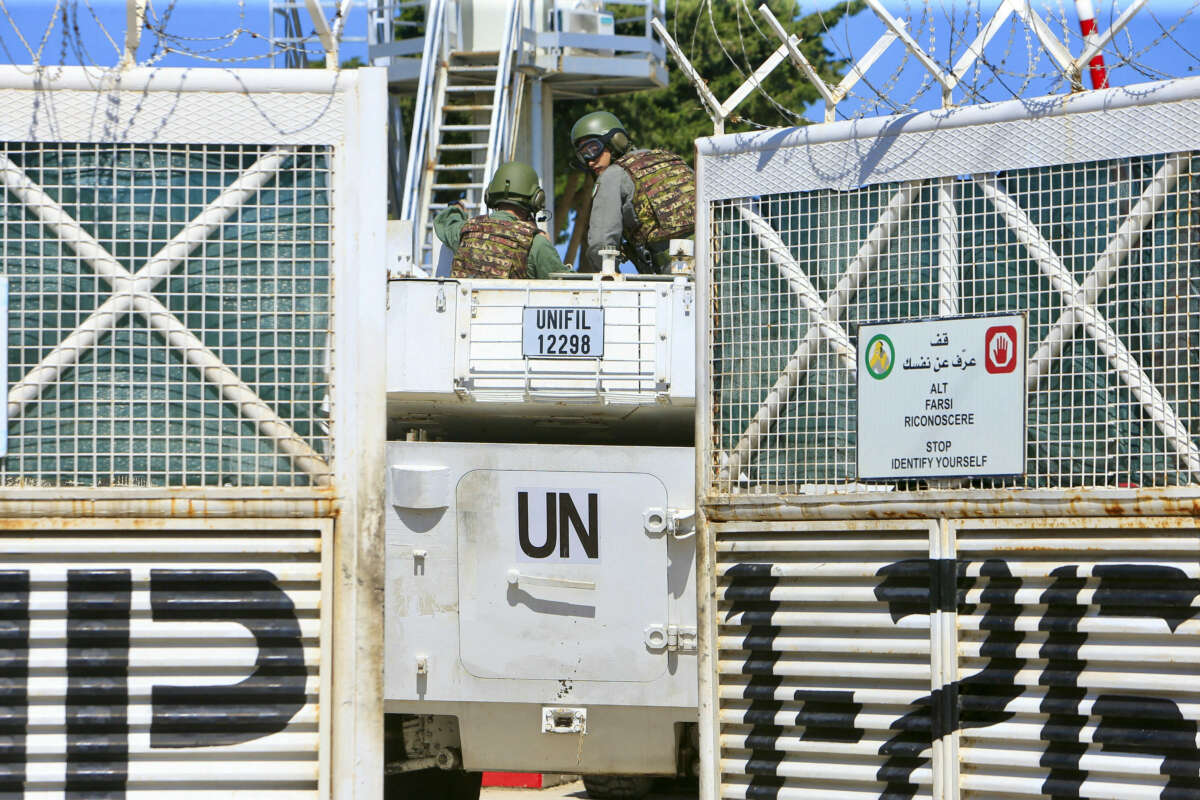Support justice-driven, accurate and transparent news — make a quick donation to Truthout today!
The UN peacekeepers’ headquarters in Lebanon came under Israeli attack for the second time in two days on Friday, the group reported as human rights experts raise alarm about Israel’s continued impunity for committing likely war crimes against UN staff and facilities.
The UN Interim Force in Lebanon (UNIFIL) headquarters in Naqoura, Lebanon, “was affected by explosions” on Friday morning, the group said. This is the second attack on the headquarters in the last two days.
Two peacekeepers were wounded and are hospitalized after two explosions affected an observation tower at the facility.
Further, on Friday, Israeli forces took down several reinforced walls near a UN position by the border in Ras Naqoura that Israeli forces opened fire on earlier this week.
An Israeli bulldozer, nicknamed caterpillars after their U.S.-based manufacturer, Caterpillar Inc., “hit the perimeter and IDF tanks moved in the proximity of the UN position,” the group said. “Our peacekeepers remained at the location, and a UNIFIL Quick Reaction Force was dispatched to assist and reinforce the position.”
The group warned that the peacekeepers are now facing “very serious risks” of violence by Israeli forces, who have spent recent days intimidating and attacking UNIFIL peacekeepers and facilities. Deliberately attacking peacekeepers is a violation of international law and Israel’s mandate, under the UN Security Council resolution 1701, to refrain from carrying out attacks in the “buffer zone” in south Lebanon.
Friday’s aggression appears to be an extension of a potentially ongoing attack by Israeli forces on UNIFIL, which was created in 1978 with the goal of ensuring that Israeli forces do not invade southern Lebanon. The group has a mandate to protect civilians in south Lebanon from military incursions.
On Wednesday and Thursday, Israeli forces carried out three attacks on UNIFIL peacekeepers and facilities. In one of the attacks, again on UNIFIL’s headquarters, an Israeli tank opened fire at an observation, injuring two peacekeepers.
Human rights experts and groups have raised alarm that Israel’s attacks on UNIFIL are likely war crimes and represent a dangerous escalation of Israel’s attacks in Lebanon and on humanitarian workers.
In a news conference on Friday, Italian Defense Minister Guido Crosetto said that Israeli forces intentionally targeted UNIFIL peacekeepers. “This was not a mistake and not an accident,” he said. Italy is one of the 50 countries that contributes troops to UNIFIL.
Human Rights Watch has called on the UN to urgently launch an investigation into Israel’s attacks on UNIFIL in order to allow the group to carry out its mandate of humanitarian work and civilian protection.
“UN peacekeepers in south Lebanon have long played a critical civilian protection and humanitarian role,” said Lama Fakih, Human Rights Watch’s Middle East and North Africa director, in a statement. “Any targeting of UN peacekeepers by Israeli forces violates the laws of war and dangerously interferes with UNIFIL’s civilian protection and aid work.”
The Israeli military has claimed that it is “conducting a thorough review” on the UNIFIL attacks and that soldiers “inadvertently” hurt peacekeepers while fighting Hezbollah in south Lebanon.
However, UNIFIL equipment and peacekeepers are very clearly marked as UN staff, and Israeli forces have attacked humanitarian groups hundreds of times throughout the genocide in Gaza and assault of Lebanon; one UN source told Al Jazeera that it “feels like Israel is going to war with the UN.”
The group expressed concern over Israel’s continued violence and threats toward UNIFIL in the past two weeks, including Israel’s demand for peacekeepers to evacuate. Israel’s attacks have made it harder for UNIFIL to fulfill its humanitarian duties, as UNIFIL’s spokesperson has said that thousands of people in villages under UNIFIL’s area of operation have been trapped without food and water because of the attacks.
“Attacks on UNIFIL not only impede the peacekeeping forces’ work but also the ability of civilians in the south to access much-needed humanitarian aid,” said Fakih.
Trump is silencing political dissent. We appeal for your support.
Progressive nonprofits are the latest target caught in Trump’s crosshairs. With the aim of eliminating political opposition, Trump and his sycophants are working to curb government funding, constrain private foundations, and even cut tax-exempt status from organizations he dislikes.
We’re concerned, because Truthout is not immune to such bad-faith attacks.
We can only resist Trump’s attacks by cultivating a strong base of support. The right-wing mediasphere is funded comfortably by billionaire owners and venture capitalist philanthropists. At Truthout, we have you.
Our fundraising campaign is over, but we fell a bit short and still need your help. Please take a meaningful action in the fight against authoritarianism: make a one-time or monthly donation to Truthout. If you have the means, please dig deep.
